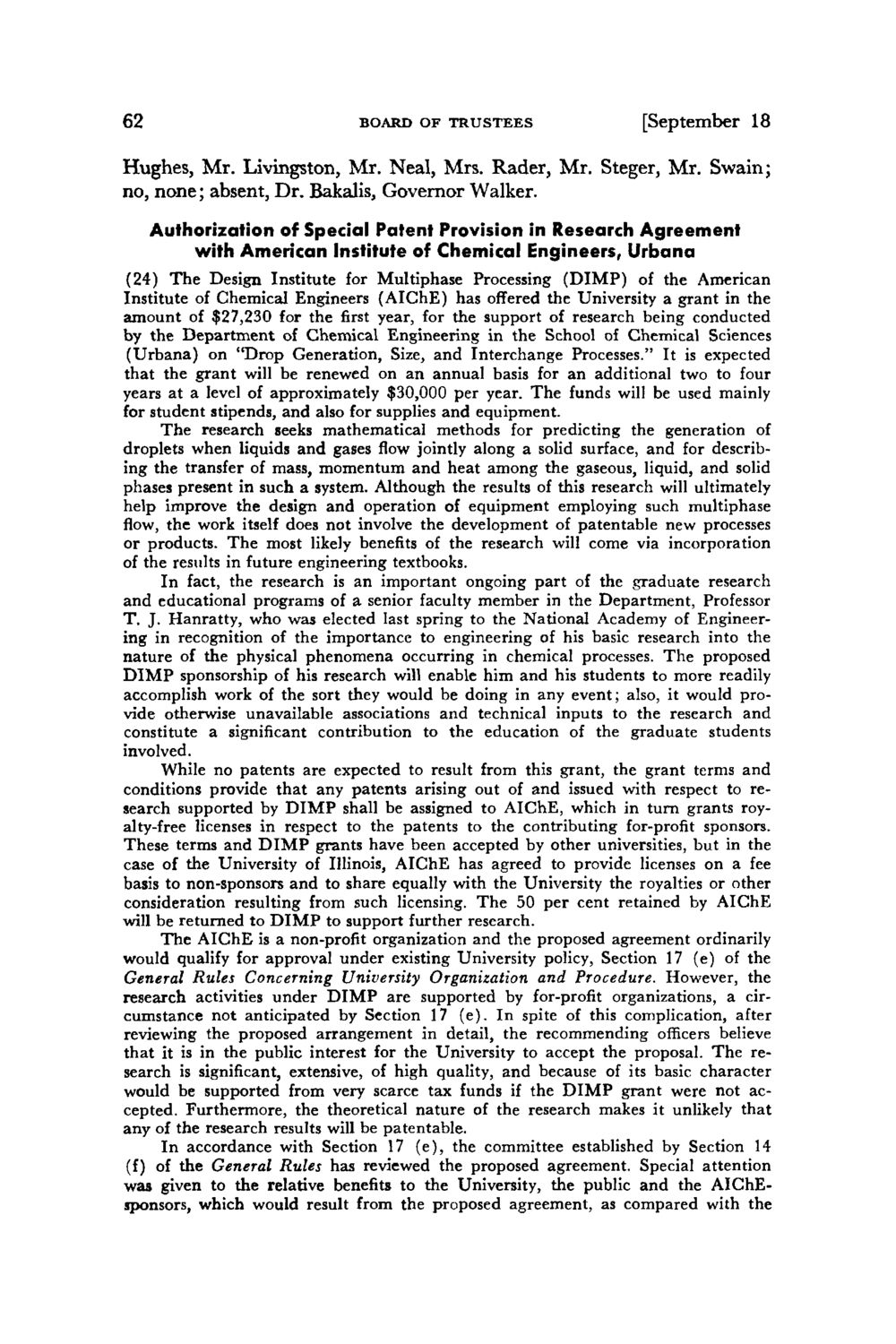| |
| |
Caption: Board of Trustees Minutes - 1976
This is a reduced-resolution page image for fast online browsing.

EXTRACTED TEXT FROM PAGE:
62 BOARD OF TRUSTEES [September 18 Hughes, Mr. Livingston, Mr. Neal, Mrs. Rader, Mr. Steger, Mr. Swain; no, none; absent, Dr. Bakalis, Governor Walker. Authorization of Special Patent Provision in Research Agreement with American Institute of Chemical Engineers, Urbana (24) T h e Design Institute for Multiphase Processing ( D I M P ) of the American Institute of Chemical Engineers (AIChE) has offered the University a grant in the amount of $27,230 for the first year, for the support of research being conducted by the Department of Chemical Engineering in the School of Chemical Sciences (Urbana) on "Drop Generation, Size, and Interchange Processes." It is expected that the grant will be renewed on an annual basis for an additional two to four years at a level of approximately $30,000 per year. The funds will be used mainly for student stipends, and also for supplies and equipment. The research seeks mathematical methods for predicting the generation of droplets when liquids and gases flow jointly along a solid surface, and for describing the transfer of mass, momentum and heat among the gaseous, liquid, and solid phases present in such a system. Although the results of this research will ultimately help improve the design and operation of equipment employing such multiphase flow, the work itself does not involve the development of patentable new processes or products. The most likely benefits of the research will come via incorporation of the results in future engineering textbooks. In fact, the research is an important ongoing part of the graduate research and educational programs of a senior faculty member in the Department, Professor T. J. Hanratty, who was elected last spring to the National Academy of Engineering in recognition of the importance to engineering of his basic research into the nature of the physical phenomena occurring in chemical processes. The proposed D I M P sponsorship of his research will enable him and his students to more readily accomplish work of the sort they would be doing in any event; also, it would provide otherwise unavailable associations and technical inputs to the research and constitute a significant contribution to the education of the graduate students involved. While no patents are expected to result from this grant, the grant terms and conditions provide that any patents arising out of and issued with respect to research supported by D I M P shall be assigned to AIChE, which in turn grants royalty-free licenses in respect to the patents to the contributing for-profit sponsors. These terms and D I M P grants have been accepted by other universities, but in the case of the University of Illinois, AIChE has agreed to provide licenses on a fee basis to non-sponsors and to share equally with the University the royalties or other consideration resulting from such licensing. The 50 per cent retained by AIChE will be returned to D I M P to support further research. The A I C h E is a non-profit organization and the proposed agreement ordinarily would qualify for approval under existing University policy, Section 17 (e) of the General Rules Concerning University Organization and Procedure. However, the research activities under D I M P are supported by for-profit organizations, a circumstance not anticipated by Section 17 (e). In spite of this complication, after reviewing the proposed arrangement in detail, the recommending officers believe that it is in the public interest for the University to accept the proposal. The research is significant, extensive, of high quality, and because of its basic character would be supported from very scarce tax funds if the D I M P grant were not accepted. Furthermore, the theoretical nature of the research makes it unlikely that any of the research results will be patentable. In accordance with Section 17 (e), the committee established by Section 14 (f) of the General Rules has reviewed the proposed agreement. Special attention was given to the relative benefits to the University, the public and the AIChEiponsors, which would result from the proposed agreement, as compared with the
| |